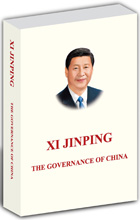| 
What are the governing ideas of China's current leadership? In which direction is China heading? What is the basis of China's foreign policy? Answers to all of these questions and more can be found in the book Xi Jinping: The Governance of China recently published by the Beijing-based Foreign Languages Press in a number of different languages.
This book is a compilation of the major works of Xi Jinping, General Secretary of the Central Committee of the Communist Party of China (CPC) and President of China, from November 2012 to June 2014. Comprising 79 speeches, interviews, instructions and correspondences structured across 18 chapters, it sheds light on the approach of Chinese leaders to the governance of the country. Excerpts of three book reviews follow:

Cai Mingzhao (Minister of the State Council Information Office): In less than two years since Xi became China's top leader, he has taken the nation onto a new journey of reform, opening up and modernization. Readers will get a clear picture of the concepts and strategies of China's leadership, get a sense of the changes taking place in China, and come to see its people's dreams and pursuits.
Xi has announced the Chinese dream of national renewal. The essence of the Chinese dream is to make the country prosperous and strong, rejuvenate the nation, and enable the people to lead happy lives. Also, in the age of globalization, the Chinese dream is connected to the dreams of people overseas and will benefit not only the people of China, but people in other countries as well.
In pursuing reforms, China has entered deep waters and is facing tough challenges. The book documents the courage and wisdom that Xi and his colleagues have demonstrated in overcoming difficulties. Xi stresses that reform and opening up play the decisive role in determining the destiny of China. He vows to take challenges head on and to brave the rapids to advance reforms.
Last year, China produced a bold reform roadmap, covering 15 sectors and involving 330 reform measures. Xi's revelation of the objectives, tasks and methods for more comprehensive and deeper reforms allows readers to see the difficulties and complexities inherent in China's ongoing reform program. Much of the determination Xi has shown in tackling problems can be explained by his personal background. As a young man, he experienced the hardships of a rural life of hunger and scarcity. Later he went on to hold a number of jobs before becoming China's president. His experience has enhanced his understanding of national conditions and people's expectations.
In recent decades, China has drastically improved its overall national strength and international standing. Not unexpectedly, many outside China hold an increasingly complicated attitude toward the country's growth. The book devotes five chapters to addressing these concerns. Xi stresses that commitment to the path of peaceful development is China's strategic choice, and that such a policy is not an act of expediency or empty diplomatic talk. Rather, it is a conclusion drawn from an objective assessment of China's history, present situation and future prospects. Since it benefits both China and the world, there is no reason why China should deviate from this path.
Xi is an excellent storyteller. His unique cultural background and rich life experience contribute to his simple, natural and vivid communication style. He says that "only the wearer of the shoes knows if they fit or not," to illustrate his stance that only people themselves can tell if the development path they are on is suitable for them. In fighting corruption, he uses the metaphor of "catching tigers as well as flies" to convey his lack of tolerance for illegal conduct. While in Brussels, he mentioned that "Chinese people are fond of tea, and Belgians love beer," to illustrate concepts of inclusiveness and mutual learning between different cultures.
| 